When looking at the work of street photographers, it’s often a common thought that, “I could do that if only I were there.” However, when you finally go out into the world with your camera it can be shocking to find that it’s not quite that easy. There’s a reason that the best street photographers are so dedicated: it’s necessary.
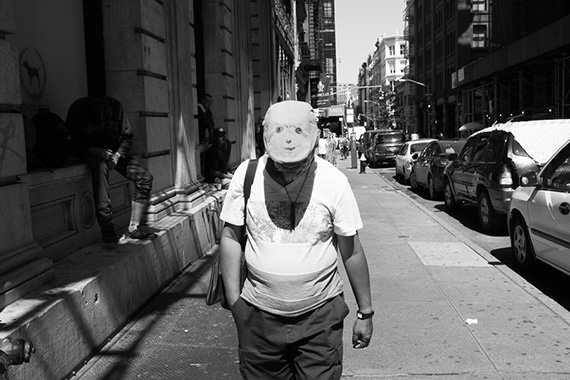
Smiley Face, SoHo, NYC
When you first start out, it’s so easy to make technical mistakes and it’s surprisingly difficult to figure out what makes for an interesting photo. These are things that are developed through time and experience, but to help you along, here is a list of the ten most common mistakes that beginning street photographers make.
1. Using a slow shutter speed and shallow depth of field
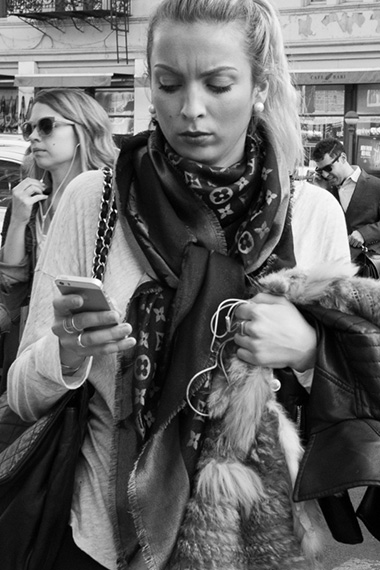
Cellphones, NYC
Whenever I teach, about eight or nine out of ten photographers come to me shooting in Aperture Priority mode. This can be great to do, however, if you are not experienced enough technically, it can also cause you a huge problem.
For street photography, a fast shutter speed is necessary to freeze the motion in people. I primarily use 1/250 of a second. If it’s sunny out, then I will shoot a little faster and if it is darker, I will go to 1/160 or even 1/125 of a second. This big problem when you shoot on Aperture Priority mode is that it’s easy to forget to pay attention to the shutter speed the camera is choosing for you. If you set your camera to f/8 in then sun and then suddenly go into a darker area, you could all of a sudden be shooting at 1/20 or 1/10 of a second without noticing. The image may still look sharp on the back screen of the camera, but then when you bring it into your computer suddenly all your images will be a little blurry.
In addition, while it’s often necessary to shoot with a wide-open aperture because of the light, shooting with a smaller aperture (f/8 or above) can be very beneficial. Context and background is key in a lot of street images and having a larger depth of field can help everything stay in decent focus. If multiple subjects pop up at different depths, then it will be easier to keep them both in focus as well. Finally, if you happen to miss the focus on the subject slightly, which is very easy to do in the fast moving world of street photography, then there will still be a good chance that you will get them in focus.
To achieve all of this, you will have to raise your ISO. I rarely shoot lower than ISO 400 in sunlight and am usually between ISO 800 and 3200. At night, I usually use ISO 6400. Test out your camera, but don’t be afraid to take some grainy images.
2. Walking too fast
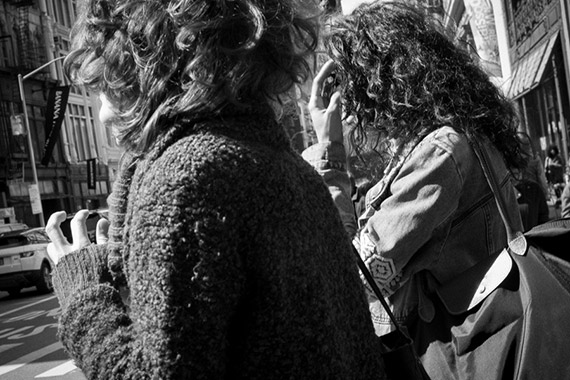
SoHo, NYC
When you go out shooting, it is common to think that you have an endpoint that you need to get to. You don’t. Every step of the way you are somewhere. Even when the images are not obvious, they are there.
It’s a common mistake to walk very quickly. It almost seems like some people think that the faster they go, the more interesting moments they will come across. But this is not the case. The same number of moments will occur whether or not you are standing and waiting for them or walking fast to find them. The problem is that by walking fast it becomes much easier to miss the moments. The slower you go, the easier it is to look around and to be ready to capture the moment when it happens.
When you go for a walk, find interesting locations to linger and wait for the right moment to happen in front of you, ready with your camera.
3. Only photographing the flashiest people
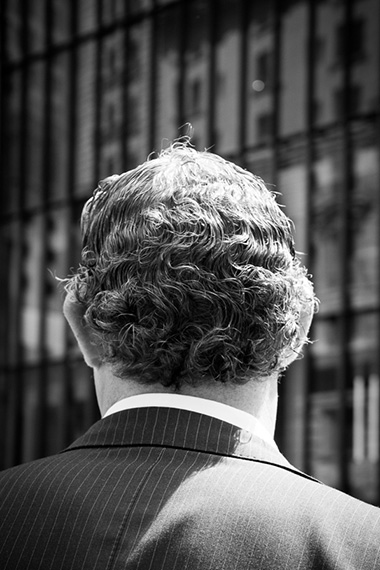
Businessman, NYC
Flashy people can be wonderful to photograph. Interesting hats, hair, clothing, tattoos, and jewelry can make for one heck of a beautiful photograph. However, these people only make up a small part of the population.
The people that aren’t as flashy are not any less interesting. They show the same emotions and can make for even more interesting images than the flashy people. Most other people are out there searching only for the flashy. Try to photograph all different types of people when you are out.
4. Not shooting enough, not looking, and being impatient
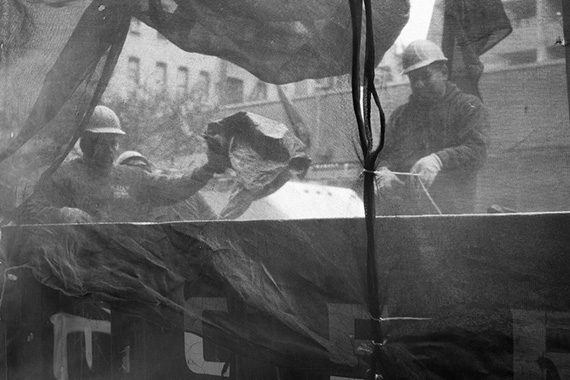
Construction Workers, NYC
The world isn’t just going to hand you moments. It is all too common for me to go out with someone and for him or her to look around frustrated like nothing is happening. They expect it to be easier. You have to work to find the best moment and you need to figure out what makes an interesting image.
An elephant isn’t just going to fall from the sky every five minutes. You have to put in the time and effort for those moments to occur. In addition to that, sometimes you have to find and create those ‘elephants.’ Sometimes the most interesting moments are the subtle ones that fly right beneath your nose. Looking and noticing the potential for good photographs is a skill that is developed over time.
The common theme that exists between all great street photographers is that they spent the time out in the world with a camera to catch those moments. They didn’t just go out on Sundays for an hour. They photographed and photographed and kept a camera with them constantly. Try to shoot on a more frequent basis. Instead of being a weekend warrior, try to find 15 minutes on a more frequent basis, wherever you are. If you don’t want to bring your camera with you, consider getting a smaller camera to take around the rest of the time, or use a phone camera. Fifteen minutes every day will make a gigantic difference and it will give you a good excuse to take a fun break and go for a walk.
5. Being too sneaky
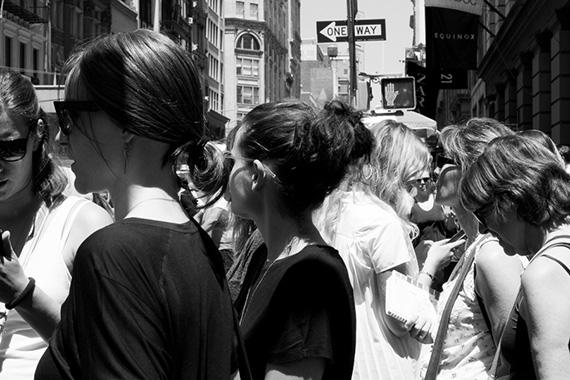
SoHo, NYC
I can be pretty sneaky with a camera when I need to be. I can look like a tourist excited by the city or someone trying to figure out how to use their camera. I can pretend to photograph a building behind a subject like the best of them. I will shoot without looking through the viewfinder sometimes. However, if I can look through the viewfinder and take a proper shot without getting punched, that’s what I’m going to do.
Sometimes you have to just look through the viewfinder and take the damn image. Shooting haphazardly without looking through the viewfinder can work, but it can also become a crutch. Force yourself to look through that viewfinder and take a steady, composed shot of a good moment. Then if you missed it you at least gave your best effort. There’s always next time.
Also, there is usually no reason to take twenty photos of the same person. If a situation develops, then hang around and wait for the moment to develop. But it is one thing to take a photo of someone and then wait for the situation to develop and it is another to point your camera at them for a minute straight while shooting constantly and waiting for something else to happen. That just makes things uncomfortable for everyone involved.
6. Only shooting outdoors and in busy places
Busy places are my favorite areas for photography. I love to be surrounded by all different types of people and if you have a limit amount of time, more moments will happen in a shorter time period in a busier area.
But the rest of the world is just as interesting to photograph. Go to quiet areas without as many people. Take photos with less going on. Find ways to make the quieter areas look unique and interesting. Take images without people in them. If you stick to only shooting in the busiest areas then you’re cutting out a majority of the world. Street photography does not just mean shooting on a busy street corner.
7. Not shooting close to home
On a similar note, try to take some images close to home and even in your home. The most interesting candid images can be the most personal. In addition, you will know the area better. If your neighborhood is quiet, then take quiet images that show it. Try not to take your neighborhood for granted. If you took someone from a different part of the world or even a different time period and parked them where you live, they would probably find so many weird and interesting aspects of the surroundings and would capture a lot of scenes that you might take for granted and overlook. What is something that might look normal to you but is actually pretty special?
8. Trying to photograph classic images
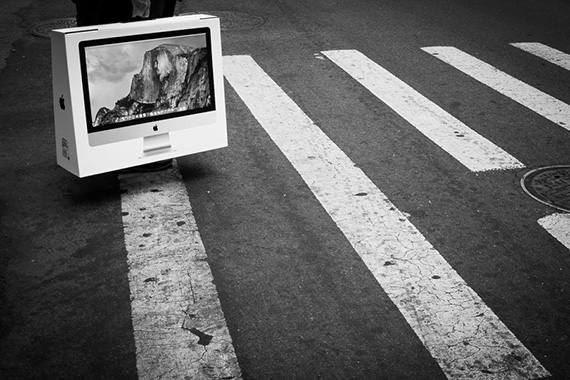
iMac, Yosemite, NYC
Street photographs are like wine; they get more interesting with age. However, it’s hard to figure out the aspects of them that will become the most interesting. Everyone gets frustrated that you cannot take a photograph these days without people staring at their phones, but that’s probably the most interesting sudden change that has happened, and who knows how long that will last for?
The images you take now that look like they are classic or old end up usually just being images that copy the look of previous photographers, back when those moments were modern. The more modern the photo you take, the more classic it will feel to someone in the future.
9. Not spending the time to organize your archive
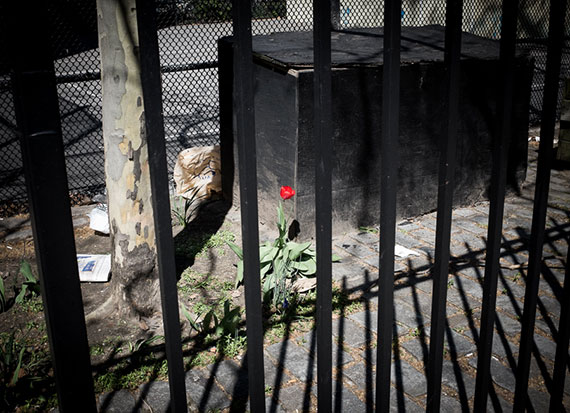
Red Rose, NYC
One of the most vital and most overlooked aspects of being a good street photographer is how you edit. You need a good system for organizing your images. If you are like any good street photographer, you will shoot frequently and your archive will grow quickly. After 10 years of shooting, what do you think will happen?
I highly suggest using Lightroom, because one of its most important features is its incredible organizational system. After a session, import your photos into your archive through Lightroom immediately and do a very quick edit. You can and should come back to them another time after the hype from the day has subsided, but you also need to create a system where you don’t get overwhelmed by a messy archive of thousands of photos.
I will immediately go through a day’s shoot after I import the images and star every decent image as three stars and every image that I love as five stars. Once a year, I will do a spring cleaning of my archive and get rid of the terrible images, but I will also make sure to go back through all of the three stars images to see if there are any gems that I missed or to lower the five star images that I no longer love. By doing this after each time you shoot, you will easily be able to go through a months of your images, click to only show the five or three star images, and will have a much more manageable group of images to evaluate.
In addition, use Lightroom’s Collections to your advantage. Collections allow you to group your photos together without having to move their physical locations on the computer. Think about the different ways that you might want to show your images together. As you grow these collections, they will start to help you think more about you are photographing and will help you find more content when you are out shooting.
10. Not printing your work
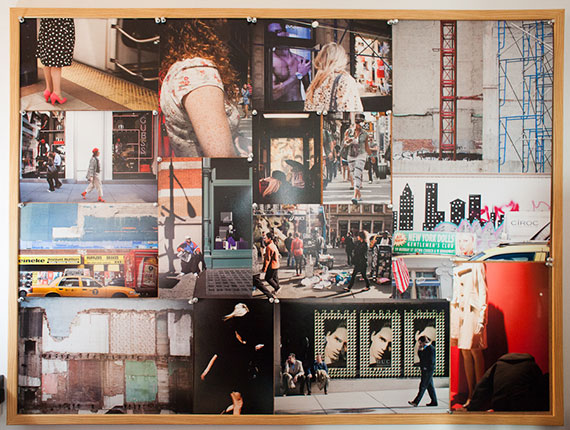
A large photography cork board from the Container Store
This goes for all types of photography, but in my experience particularly street photography. Street photography images are not usually classic images that people think about putting on their walls, but that does not mean that you should not print them (or put them on your walls).
Street photographs can work well alone but often they work great in groups. Create a group of your street images that work together and put them next to each other on a wall. Another fun idea is to purchase a cork board and fill it up with your street images. You should also consider printing out a lot of 5×7 images, sequencing them, and storing them in a nice box or place for your friends and family to see. Or use Blurb to create a book of your images to display. These images deserve to be shown in places other than a website or blog. They deserve to be printed just as much as a beautiful landscape.
About the Author:
James Maher is the author of Essentials of Street Photography, which covers everything about the genre even down to specific post processing techniques that can bring the best out of street scenes.
Go to full article: Are You Making These 10 Common Street Photography Mistakes?
What are your thoughts on this article? Join the discussion on Facebook
PictureCorrect subscribers can also learn more today with our #1 bestseller: The Photography Tutorial eBook
The post Are You Making These 10 Common Street Photography Mistakes? appeared first on PictureCorrect.